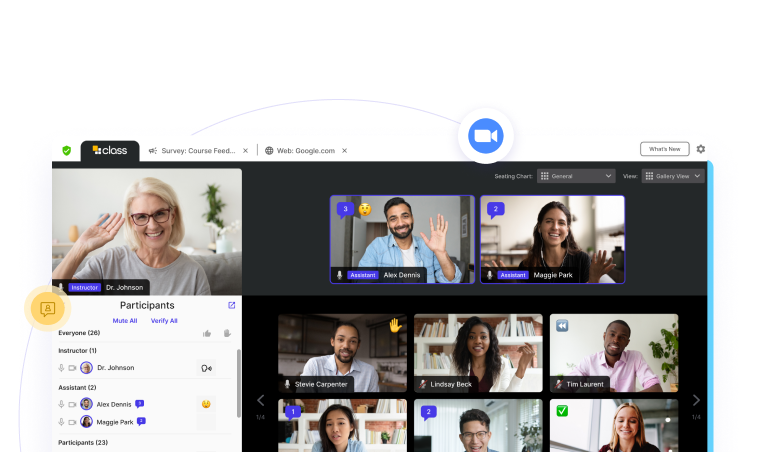

Class is the next generation virtual classroom for K-12, higher education, government agencies, and the workplace. Contact us today to schedule your live demo and see Class in action.

Class is the next generation virtual classroom for K-12, higher education, government agencies, and the workplace. Contact us today to schedule your live demo and see Class in action.

Higher education has looked different in the past year and will likely continue to be different moving into the future, even after many classes are able to convene in person. Zoom has become a go-to tool used on college and university campuses to make virtual learning and hybrid college classes not only possible but increasingly more engaging. Colleges using Zoom are finding new ways to leverage the tool in both online and hybrid college classes. Here we look at some tips for teaching hybrid courses and the benefits they offer, based on the experiences of educators and students during the pandemic that will continue to hold value for instructors long into the future.
Yoga Prakasa is a teaching assistant at Johns Hopkins University’s Carey Business School. He and his professor, Luis Quintero, have relied on Zoom to deliver real estate courses to more than 60 graduate students since August 2020. They weren’t though, teaching from the same place. Prakasa was teaching from Minneapolis while Quintero was teaching from the Washington, D.C. campus.
Prakasa says he thinks colleges will still use Zoom for the better part of 2021. While some schools are beginning to open their doors for onsite learning, many classes are still online. “Even with onsite learning, Zoom will still likely be utilized in conjunction to facilitate remote students,” Prakasa predicts. These students, he says, will include those who can’t be onsite due to lower classroom capacity limits as well as international students who may be facing immigration processing delays. Class builds on Zoom to offer teachers and students opportunities for hybrid interactions, even when they are participating from different locations with different levels of access and equipment.
And the benefits of virtual instruction won’t be limited to the pandemic, he and others say.

Darin Detwiler, an assistant dean and associate teaching professor at Northeastern University’s College of Professional Studies in Boston, points to some other types of students who will continue to benefit from colleges using Zoom as an instruction option:
Eric Kim, co-owner and program director of private tutoring company LA Tutors, sees a wide range of potential use cases for Zoom into the future. “I see Zoom being used to assist in making office hours and study groups more accessible to students with transportation and scheduling concerns,” he says. In addition, he says: “Zoom can accommodate students who cannot access the classroom, allowing them to “be present for classes they might otherwise have missed. This could include immunity-compromised, hospitalized, or ill students, unsupportive parents, students with anxiety or depression concerns, students without transportation, and many others that could not otherwise access a physical classroom for a time.” Most faculty meetings and administrative committees would also be more easily accessed by Zoom, says Kim, allowing more flexibility and greater participation for administrative decisions and information dissemination.
In addition, notes Detwiler, even students who are able to attend in-person classes can benefit from the opportunity to go back and review classes that have been recorded via Zoom.
Professors also benefit from opportunities for remote instruction, Detwiler says. “I, as the professor, have needed to be out of town during a scheduled on-ground class and was able to shift that week to an online modality while using Zoom,” he says. He’s taught classes in Boston, but from Seattle, San Francisco—even London and Dubai. Zoom makes this all possible so neither students nor professors need to miss a beat.
His interactions with students from locations around the globe have added to his credibility, he says. And, he says “I was able to share photos, videos, observations, or interesting notes related to the topics and make my experience part of their experience.”
Another shift, says Diane Gayeski, PhD, professor of strategic communications at Roy H. Park School of Communications at Ithaca College, will be fewer classes canceled or handled by a hastily-arranged substitute. “If a professor is feeling a bit unwell, she may still be able to conduct a Zoom meeting from home. If a professor is traveling for research or a conference presentation, he can still hold class over Zoom.” And, she adds: “We won’t see ‘snow days’ in the future.”
The benefits of remote instruction aren’t limited to the professor and students who are formally associated with the course, either. Colleges using Zoom, and their instructors, are able to reach out to other experts around the world to augment their classes, says Detwiler.
“I have been fortunate to allow guest speakers from all over the world to come, virtually, to my class and share their thoughts or view students’ presentations or answer students’ questions on the topics,” he says. “The guests are typically experts from industry or the government sector who gladly volunteer when asked.” Student feedback, he says, indicates that these opportunities represented some of the best aspects of the course.
Gayeski, who is also a consultant in corporate communication and instructional technologies, agrees that “one of the major shifts has been the inclusion of guest speakers because it’s so easy to quickly bring in an expert to share expertise or opinions on a given topic.” And, she says, unlike inviting someone to campus, especially if it involves extensive travel, “a Zoom meet-up costs nothing, and the faculty member does not feel an obligation to turn over the entire class period to the guest or to entertain the guest,” she says.

Michael Fray is a college student who blogs about his studies and student life. While he acknowledges that online Zoom sessions offer convenience and are well-suited for not only classes, but also for events like webinars, employer information sessions, and recruitment events that can be attended from anywhere, he doesn’t believe they will replace live classes. “Many classes are unlikely to be replaced with online Zoom meetings when in-person alternatives are allowed,” he says.
Still, the ability to hold certain types of classes or other interactions online offers conveniences like the ability to attend classes from anywhere, reduced commute times and access to learnings that might otherwise have been impossible.
Colleges using Zoom are increasingly doing so in a hybrid world—a world that is likely to continue to leverage the benefits of remote instruction for years to come.

Class is the next generation virtual classroom for K-12, higher education, government agencies, and the workplace. Contact us today to schedule your live demo and see Class in action.

Class is the next generation virtual classroom for K-12, higher education, government agencies, and the workplace. Contact us today to schedule your live demo and see Class in action.
Get our insights, tips, and best practices delivered to your inbox

Sign up for a product demo today to learn how Class’s virtual classroom powers digital transformation at your organization.

Features
Products
Integrations